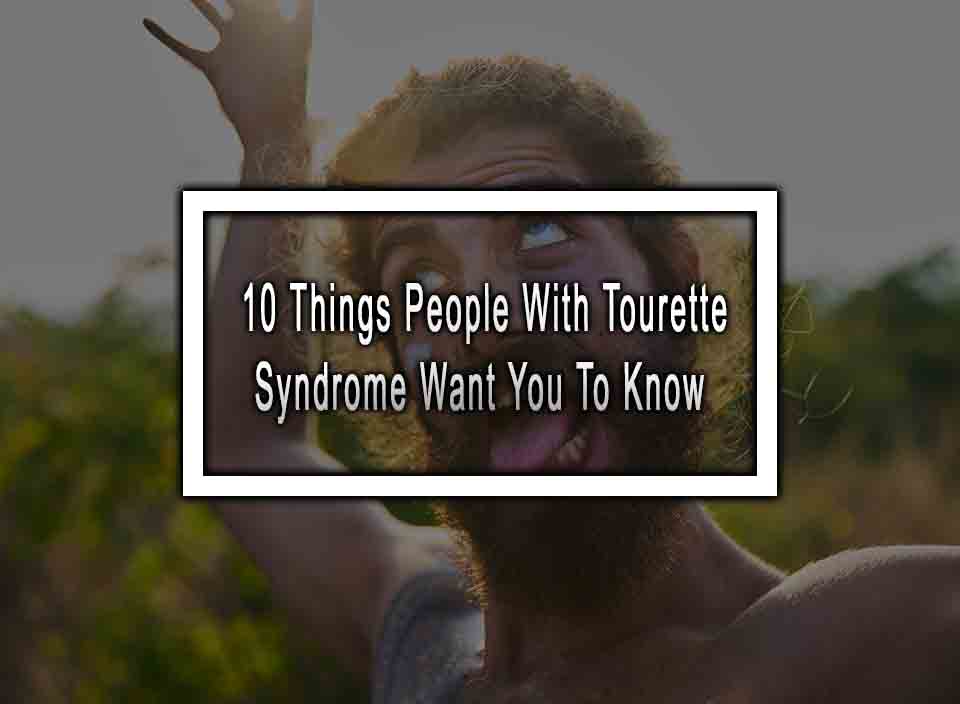Table of Contents
ToggleThings You Need to Know About Tourette Syndrome
Tourette syndrome is a neurological disorder that affects approximately 200,000 Americans, and yet it remains widely misunderstood. While people with Tourette’s exhibit involuntary movements and vocalizations called tics, the condition is much more complex than just random outbursts. In this listicle, we will uncover 10 things that those with Tourette syndrome want you to know so that we can better understand and accept those living with this disorder.
Tics Are Involuntary
People with Tourette’s cannot control their tics – they are involuntary movements or sounds that just happen. It’s not like they can decide to stop ticking. Just like you cannot decide to stop sneezing once you’ve started, people with Tourette syndrome cannot control their tics either. So, if you see someone with Tourette’s ticking, don’t stare or judge them for it.
There’s More to Tourette Syndrome Than Swearing
One of the biggest misconceptions about Tourette’s is that those with the disorder frequently swear uncontrollably. However, this only applies to a minority of people with Tourette’s (known as coprolalia). Most people with Tourette’s have tics that are not offensive and may include movements like eye blinking or shoulder shrugging, or vocalizations like grunts or coughs.
There Are Different Types of Tics
Tics can manifest in different ways. Simple tics are brief, sudden, and repetitive movements like eye blinking, head jerking, or nose twitching. Complex tics, on the other hand, involve coordinated movements that may be more spontaneous, less repetitive, and may even involve a set of pre-planned actions. While simple tics may be less conspicuous, complex tics may be more noticeable and disruptive.
Stress Can Trigger Tics
People with Tourette’s often report heightened tic activity during stressful periods or events. Anxiety, fatigue, or excitement can trigger a flurry of tics, which may further exacerbate stress. Therefore, it’s essential to understand that social situations and anxiety-inducing triggers may exacerbate tics for people with Tourette syndrome.
Tics Can Be Masked
While it’s true that people with Tourette’s cannot stop tics from happening, they can sometimes suppress tics temporarily. This suppression, however, can lead to extreme mental and physical discomfort, which may eventually result in more severe outbursts of tics.
Tourette Syndrome Is Not Contagious
Tourette’s is not a contagious illness – you can’t catch it from someone else, and you can’t pass it on through contact. It’s also not a mental illness but a neurological one, and people with Tourette’s have brains wired differently from those without the condition.
Tourette Syndrome Can Co-Exist with Other Conditions
People with Tourette’s may have other associated disorders like attention-deficit/hyperactivity disorder (ADHD), obsessive-compulsive disorder (OCD), depression, or anxiety. The coexistence of these issues complicates the condition further, and it’s crucial to understand that those with Tourette syndrome may struggle with more than just tics.
There’s No Cure for Tourette Syndrome
Currently, there’s no cure for Tourette’s, but it’s possible to manage it with medication, therapy, and other interventions. While these treatments may not eliminate tics entirely, they can help reduce their frequency and severity and improve the quality of life for those with Tourette syndrome.
Tourette Syndrome Does Not Define Someone
People with Tourette’s are just like everyone else – they have unique personalities, interests, and strengths that define them beyond their condition. Tourette syndrome is just one aspect of their lives, and it isn’t a defining characteristic that should dictate how we interact with them.
Conclusion
By understanding the complexities of Tourette syndrome, we can help reduce myths and prejudice and create more inclusive and accepting communities. People with Tourette syndrome want the world to see them beyond their tics and to appreciate them for who they are – just like everyone else.
Tourette Syndrome FAQ
Here are the most common questions about Tourette syndrome.
How common is Tourette Syndrome?
Tourette Syndrome affects around 1% of the population or about 1 in every 100 people.
When is Tourette Syndrome typically diagnosed?
Tourette Syndrome can be diagnosed at any age, but it is most commonly diagnosed in childhood.
Is Tourette Syndrome genetic?
Research suggests that Tourette Syndrome has a genetic component, though the exact cause is unknown.
Can Tourette Syndrome be treated?
While there is no cure for Tourette Syndrome, the symptoms can be managed with medications, behavioral therapies, and lifestyle changes.
Do all people with Tourette Syndrome swear or use obscene language?
No, this is a common misconception. While some people with Tourette Syndrome may have coprolalia (the involuntary utterance of obscene words or phrases), it is not a defining symptom of the disorder.
Can people with Tourette Syndrome lead normal lives?
Yes, with proper treatment and support, people with Tourette Syndrome can lead normal lives and have successful careers and relationships.












